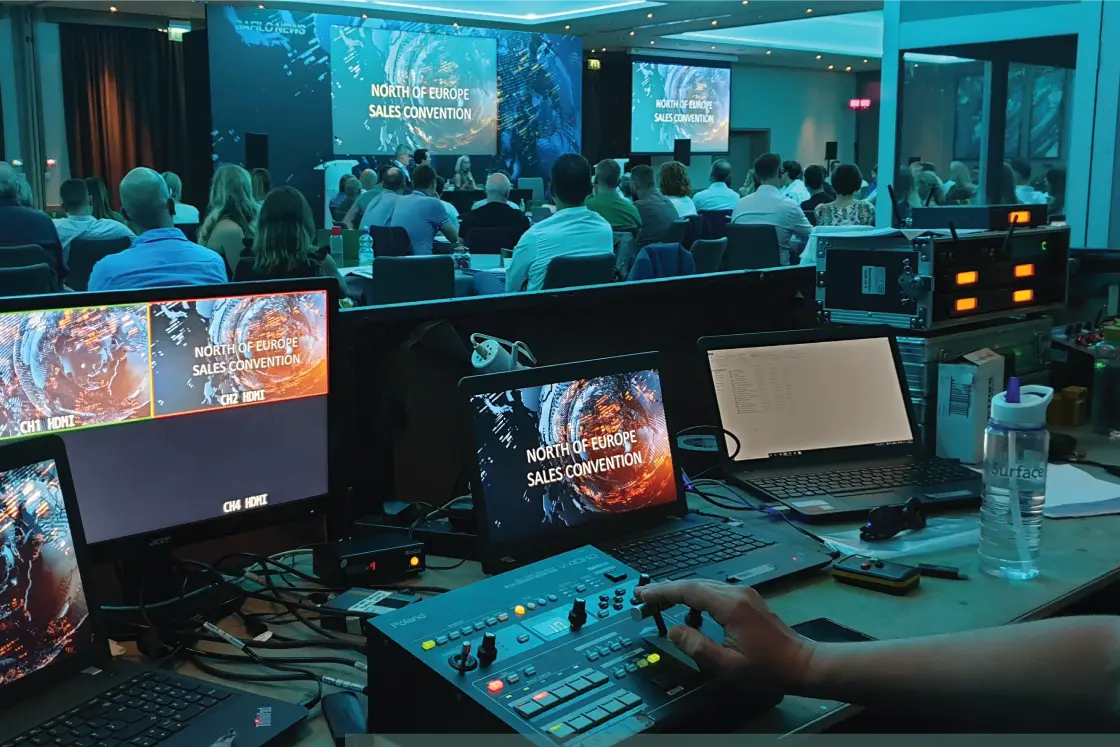The event industry has undergone a magnificent transformation during the pandemic. After moving back and forth between virtual and in-person events, we are now witnessing the rise of hybrid events. It’s a revolutionary shift that is redefining the very essence of how we gather, engage, and connect.
In its essence, a hybrid event is the fusion of technology and human connection. This is where the physical and the virtual worlds shake hands to unfold limitless possibilities.
In case you don’t know what a hybrid event is and how it works, we’ve got your back. This article discusses the details of hybrid events and how your businesses can benefit from this trend. You’ll be reading hybrid events examples and their benefits and learning about the best hybrid event platforms.
What is a hybrid event?
A hybrid event is a harmonious fusion of the physical and virtual worlds. It blends the traditional in-person event experience with the boundless possibilities of online connectivity. In this type of event, you address and cater to attendees present in the venue physically and people joining online. The remote audience can join from various corners of the world.
How does a hybrid event work?
The goal of a hybrid event is to offer a seamless, dynamic experience to the audience, regardless of their location. To do so, you must bring your two audiences (virtual and in-person) closer, using a combination of event equipment. You might have to install digital screens or hire live streaming services for optimal experiences. Some also use virtual breakout rooms equipped with specific digital elements.
However, the key to a successful hybrid event is synchronisation. You must broadcast the event in real time from the physical venue to your online audience. They must feel involved in panel discussions and should be able to listen and ask keynote speakers instantaneously.
Hybrid Event Trends and Statistics
Hybrid events are in trend right now as businesses are seeking to increase their audience reach. Recent market research shows that organisations are making hybrid events a part of their company culture. About 38.8% of them are of the opinion that hybrid events are the most popular choice.
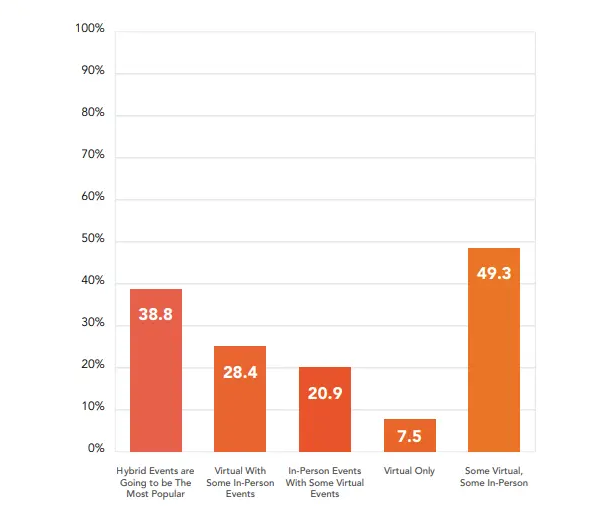
This is a big improvement considering the previous survey report. In 2021, after the pandemic, industry experts favoured virtual events over in-person events. Only 14.8% considered hybrid events to have a future in the upcoming years.
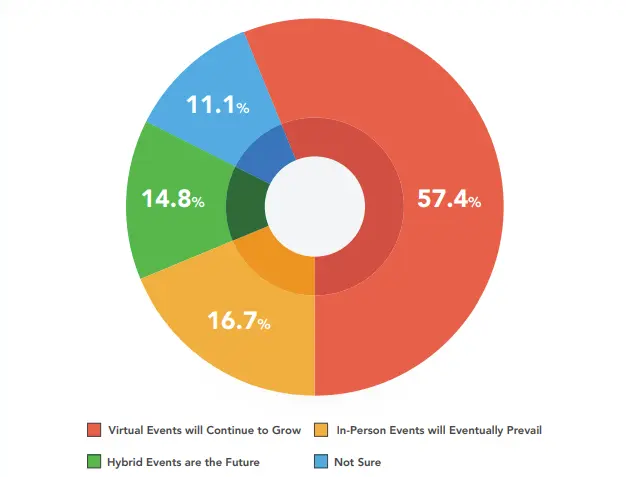
But trends are changing, and now, Hybrid events are capturing the market. They are now a part of PR strategies, while corporations are using them to increase audience reach. SMBs are opting for hybrid events as they require less effort and staff which make them a cost-effective solution.
However, it’s essential to get yourself familiar with the basics before jumping on this bandwagon. Let’s start with the types, and then we’ll discuss their examples and benefits.
Types of Hybrid Events
Hybrid events can be categorised into 4 main types based on their production models.
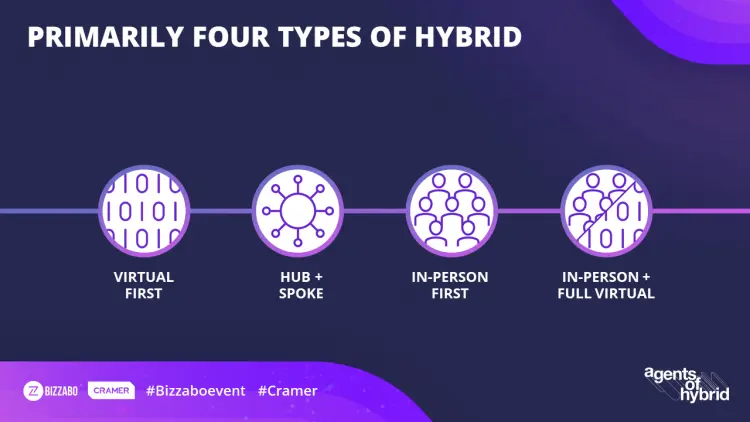
In-Person First Events
For such hybrid events, organisers and producers majorly focus on the onsite attendees. It’s like a live talk show; presenters and speakers perform for the physically present attendees. But content is curated and produced keeping in mind the needs of virtual attendees.
Virtual First Events
As the name gives it away, these are hybrid events specifically produced for the virtual (online) audience. Such an event usually has a small in-person audience but its goal normally is to reach a wider audience. All speakers or presenters use the same stage or studio to deliver content. However, the organisers and producers ensure that content is available on demand to their virtual attendees.
Hub-and-Spoke Events
These are diversified hybrid events where you have multiple content sources. The produced content is aggregated and presented to the audience as per event requirements and the audience’s needs. This way, you can allow attendees to join sessions and consumer content as per their interests. It’s a great way to keep your audience hooked to improve the overall engagement level.
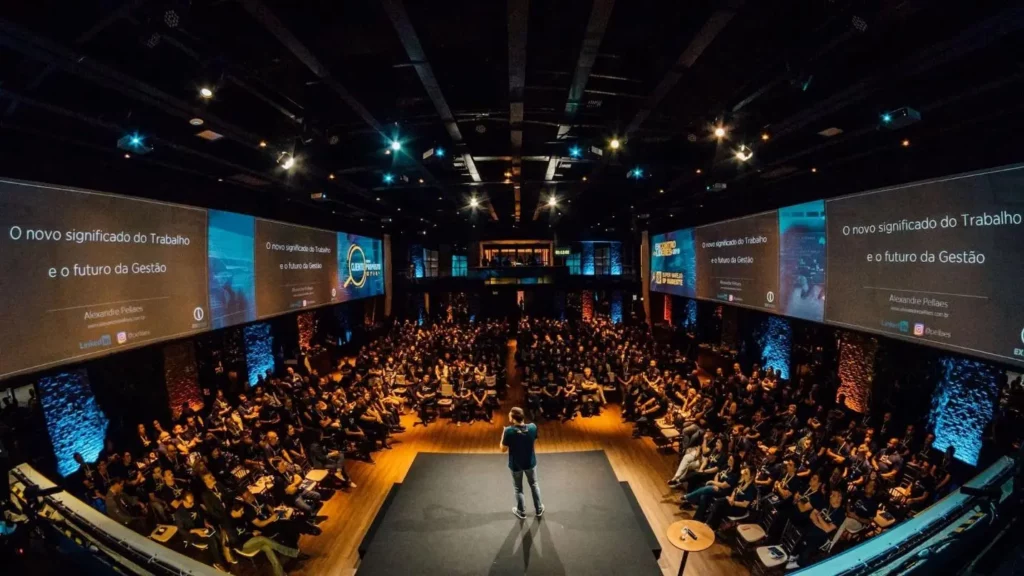
Simultaneous or Full In-Person and Virtual Events
This production model is often referred to as a “True Hybrid event.” That’s because the organisers focus on in-person and virtual attendees simultaneously ensuring they get a seamless experience. It mimics both virtual and in-person events while merging all the good points. Such types of hybrid events are highly interactive but difficult to produce as a lot goes into them.
Hybrid Events Examples
With time, organisations and B2B businesses have started choosing hybrid events for better marketing and user engagement. Here are three hybrid events examples that will tell you how large corporations are getting benefits from them.
Forrester B2B Summit 2023
An ideal example of a hybrid event is the B2B Summit North America. This annual marketing event was held physically in Austin with an open invitation for virtual attendance. Marketers across three different regions (North America, APAC, and EMEA) joined the summit to learn business strategies. Organisers allowed participants to access keynote speeches, breakout rooms, and a digital sponsor marketplace.
Apple Far Out 2022
People, especially tech enthusiasts, love Apple’s special events. And if you have doubts, take a look at their “Far Out” event that took place last year. It is also a great example of hybrid events as it drew nearly 3.69 million online viewers.
INBOUND by HubSpot 2022
Another great hybrid event example is HubSpot’s yesteryear event “INBOUND.” The platform held it virtually and in-person for the first time and needless to say, it was a big success. It was organised at the Boston Convention and Exhibition Center, where over 60,000 people joined the event physically and online. Remote attendees were given access to virtual networking tools and on-demand content.
Need Help With Your Hybrid Event?
Let professionals do the heavy lifting for you
Contact EMS Today
9 Benefits of Hosting Hybrid Events for Businesses
Hybrid events have emerged as a game-changing phenomenon in the corporate world, offering a blend of in-person engagement and virtual connectivity that brings a plethora of benefits to businesses. As the business landscape evolves, so do the ways in which companies communicate, collaborate, and connect. Here, we explore the
Below are some advantages of hybrid events to businesses of all sizes and industries.
Provides Access to A Larger Audience
The biggest benefit of a hybrid event is extended reach. These types of events surpass geographical limitations and offer you access to a diverse audience. You get to address both physical and online attendees at the same time. This also allows international companies to bring together their global workforce on a single platform.
Offers Flexibility to Your Audience
Event preferences keep changing with the audience depending on their needs. Some favour joining virtual events while others prefer attending in-person events. With a hybrid event, you can target both kinds of attendees at the same time.
Serves As a Cost-Effective Option
Planning and holding an in-person event is a hectic task. Not only does it require more effort but also cost more than a virtual or hybrid event. You have to bear event production costs including venue expenses, travel costs, accommodation, and more.
Hybrid events serve as a cost-effective solution for corporate businesses that want to address a bigger audience. You can reduce arrangement costs as there will be fewer people attending physically. You’ll require less labour and a few equipment pieces which will further lower the overall cost.
Increases Audience Engagement
As compared to in-person or virtual events, hybrid events offer a spectrum of engagement opportunities. Physical attendees present at the venue can enjoy and immerse themselves in the tactile experience. On the other hand, remote participants can take part in interactive Q&A sessions, live polls, and virtual networking. Such a multifaceted engagement approach ensures that both types of attendees remain connected and invested throughout the event.
Creates New Networking Opportunities
Hybrid events provide new and innovative ways for participants to connect. Event organisers, planners, and producers can improve networking through group discussions or one-on-one video chats. They can also use AI-driven matchmaking to help attendees form meaningful connections and expand their professional networks.
Produces Global Thought Leadership
Hybrid events provide you with a platform to establish yourself as a global thought leader. Like virtual events, they allow industry experts to share insights and knowledge with a worldwide audience. As a result, your business gets to position itself as a hub for cutting-edge ideas and discussions. Furthermore, your experts can establish and earn a reputation as forward-thinking industry leaders.
Extends Your Content Lifespan
During hybrid events, you have the tools to record important sessions and presentations. Thus, you can repurpose content for other platforms or make it available on-demand. This allows both in-person and virtual attendees to revisit valuable insights later. Moreover, you can share the content with those who missed the live event and they can catch up at their convenience.
Strengthens Data Collection and Analytics
Hybrid events are made possible through platforms that provide a wealth of data analytics. Businesses can leverage this data to gain insights into attendee behaviour, preferences, and interactions. Following this data-driven approach, businesses can refine their marketing and content strategies. They can customise the content according to the target audience and their needs to improve future event planning.
Improves Sustainability and Environmental Impact
One of the major benefits of hybrid events is the sustainability impact. It’s a greener alternative that helps businesses minimise their carbon footprint as fewer people join the event physically. The reduction in large-scale gatherings means less travelling, fewer equipment pieces, and small logistical needs.
Thus, businesses can contribute to sustainability efforts while maintaining their commitment to corporate social responsibility. In an era of heightened environmental consciousness, such an effort can help your business earn a good name.
Necessary Equipment Required for Hybrid Events
For a hybrid event, you need a careful selection of equipment to seamlessly integrate the physical and virtual components. Below is a concise list of the necessary equipment to ensure the success of your hybrid event.
Visual Equipment: High-quality cameras (stationary and pan-tilt-zoom), LED video walls, tripods, and mounts
Audio Equipment: Handheld and Lavalier microphones (both wired and wireless), speakers, amplifiers, audio mixers, PA, and sound system.
Lighting Equipment: Followspot, LED profile uplighters, lighting controllers, Ring lights, softboxes, and more.
Live Streaming Equipment: Hardware, internet connectivity, streaming platform, display switchers, monitors, and screens.
Stage Design: Backdrops and branding materials, deck risers, handrails, transport trolly, furniture and seating (to accommodate attendees and presenters), and more.
Technical Support: Skilled technicians to handle setup, troubleshooting, and ensuring smooth operation throughout the event.
How to Conduct Hybrid Events -Best Practices
Conducting successful hybrid events requires a delicate balance between the physical and virtual components. You must ensure both in-person and remote attendees are having an engaging and seamless experience.
Below are hybrid event best practices that you can follow.
- Define your objectives clearly (reach, networking, valuable content production, etc.)
- Design interactive activities (live polls, Q&A sessions, and virtual breakout rooms)
- Maintain consistent branding (Signage and banners at the physical venue and hybrid event platform)
- Test technology thoroughly beforehand
- Encourage interaction between attendees, speakers, and sponsors.
- Adapt content for the virtual audience (provide camera-friendly presentations and sessions)
- Offer on-demand content (record sessions and make them available)
- Collect data and analyse attendee engagement and session popularity
- Clearly communicate event details, schedule changes, and instructions to both in-person and virtual attendees
- Provide guidelines to prepare speakers and moderators for the hybrid format.
- If your event has a global audience, schedule sessions to accommodate various time zones.
- Select a reliable hybrid event platform that offers features such as live streaming, virtual networking, Q&A sessions, and analytics.
5 Best Hybrid Event Platforms in 2023
A pivotal element in the success of any hybrid event is the platform on which it is hosted. You’ll need a platform with the ability to create immersive and engaging experiences for both in-person and remote participants.
Below are five popular hybrid event platforms that are redefining the hybrid event trends.
Bizzabo – Suitable for Business Conferences
Bizzabo offers a comprehensive suite of tools, encompassing almost every aspect of event management. It is nothing short of a powerhouse in the hybrid event arena. The platform can streamline the entire event journey from pre-event marketing and registration to live streaming and post-event analytics.
Then there are networking capabilities and AI-driven matchmaking algorithms that elevate attendee engagement. So, you can rest assured that participants will be forging valuable connections whether they’re attending in person or virtually.
Hopin – Best for Hybrid Events and Live Streaming
Founded in 2019, Hopin has quickly made its place as an innovative and versatile platform. It facilitates the seamless integration of both physical and digital elements. What makes Hopin unique is its exclusive features like virtual expo booths, networking lounges, and live streaming, interactive workshops. Furthermore, its robust analytics and engagement tools empower event organisers and producers to tailor experiences to attendee preferences.
Vfairs – A Comprehensive Platform for Hybrid Events
Considering its features, Vfairs is one of the best hybrid event platforms. The tool has earned the place thanks to its user-friendly interface and customisable virtual booths. Vfairs empowers businesses to deliver memorable experiences to both in-person and virtual attendees through interactive sessions and live streaming.
For businesses seeking to capitalise on the networking potential, it’s a great hybrid event tool. Its emphasis on attendee interaction and lead generation makes Vfairs a valuable asset.
Notified – Ideal Platform for Hybrid Events
Powered by Intrado, Notified is a dynamic platform for immersive hybrid events. The platform transports attendees into a captivating digital environment that mirrors the physical event, creating personalised experiences. Its interactive 3D spaces offer real-time audience engagement features including virtual reality (VR) and augmented reality (AR) capabilities. If you need a futurist hybrid events platform, Notified is the right tool.
ON24 – Hybrid Event Platform for Marketers
ON24 leads the market when it comes to offering personalised experiences during hybrid events. Its webcasting and virtual environment capabilities allow businesses to create captivating hybrid events that maximise reach and interactivity. Moreover, event organisers can understand attendee behaviour and preferences using ON24’s data-driven insights. This feature enables them to refine strategies and create more compelling experiences in subsequent events.
Final Note
Hybrid events are great for businesses that want to target physical and virtual audiences at the same time. They offer better engagement rates and are cost-effective as well as environmental-friendly. However, the key to a successful hybrid event is finding the right production company and the best virtual platform.
EMS Events, having over 25 years of experience, offers the best hybrid event production services in and across London. Our extensive range of equipment and skilled technicians enable us to deliver top-rated services. Contact us to get customised virtual and in-person event production services as per your business needs.
